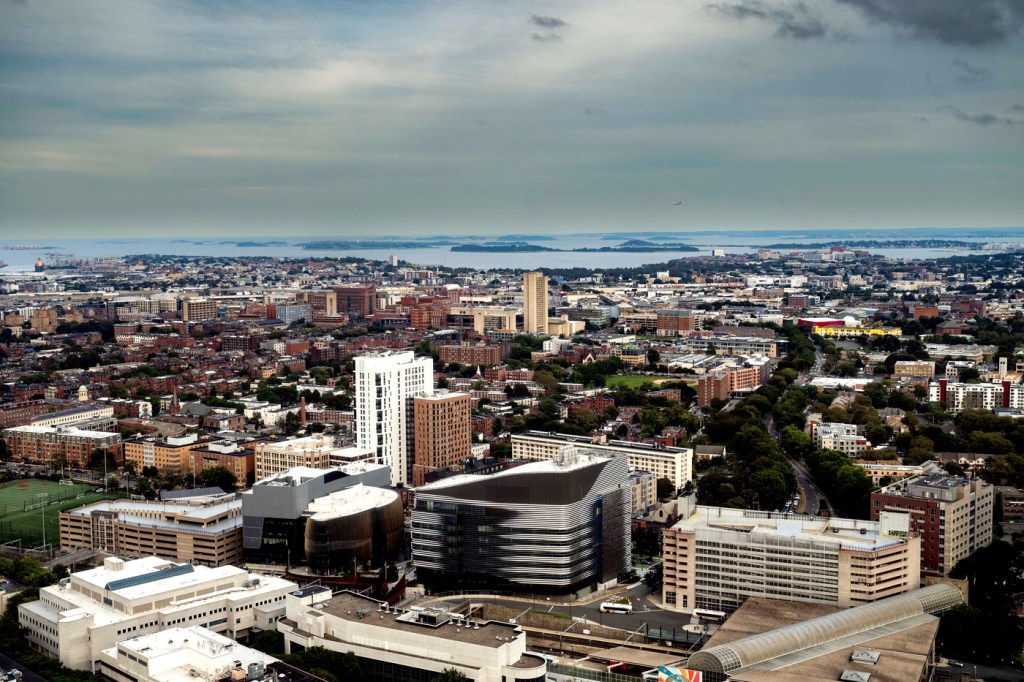How can cities use AI? These professors are creating guidelines for how artificial intelligence could be used for public interest

Everyone is learning to navigate artificial intelligence, and cities are no exception. But thanks to a recent grant, two Northeastern University professors are helping the city of Boston and its residents channel AI for the greater good.
The Public Interest Technology University Network recently awarded a Network Challenge Grant to Northeastern University and its Boston Area Research Initiative, run by Dan O’Brien and Kim Lucas, both of whom teach public policy in the School of Public Policy and Urban Affairs. The grant funds projects dedicated to growing public interest technology.
O’Brien and Lucas will use the grant to research how AI can be used by the city of Boston and to educate residents on its usage.
“I’m excited to be part of the team awarded a PIT-UN Network Challenge Grant,” said Lucas. “It’s such a great opportunity that supports the work that BARI is doing as a bridge between our campus community and the greater neighborhoods and city we are a part of. I’m excited to continue to be an innovative leader in the civic tech community as we expand our work to consider the benefits and challenges of AI both on campus and in our neighborhoods — and to think about how experts of all kinds are going to be needed to think and work together to use this tool to produce positive change that we see and feel every day.”
BARI is partnering with the city of Boston and its Department of Innovation Technology to produce a report with guidelines and use cases for AI use. This can be used to build off Boston’s existing policy on AI use in public service.
Beyond creating a report for the city, O’Brien and Lucas hope to educate the community on AI.: What it is, how it can be used, and what questions they need to ask when this technology is being used in public services. To do so, they’ll also partner with Tech Goes Home, a local nonprofit dedicated to digital equity. Tech Goes Home will help convene community organizations to have these conversations.
As AI grows more common, so do its potential uses. For example, predictive policing can help predict where the next crime will occur. Cities can also use it on websites: O’Brien gave an example in which someone could send in a photo of a pothole and AI could direct the person reporting it to the right department who can fix it. This sort of modeling can be used for other services as well.
But there still is a learning curve for people so far as exactly how it can be used and what concerns there are surrounding its use. (O’Brien cites data privacy and machine bias as a few.)
Cities — and their residents — need to consider just how to respond to this data and if there’s limits to how they want it used. In order to do that, people need to understand the different types of AI and how it can be applied. This grant will ensure that Boston and its residents have the knowledge they need to join the conversation.
“The real goal here is to work with a variety of partners in and outside the university to generate guidelines and inspiration for the use of artificial intelligence, designed by community members and youth living in those communities,” O’Brien said. “We have this tech, but we’ve got to know how to advocate around it. We’ve got to know how to build with it in ways that reflect what the community wants and needs.”
Through the grant, O’Brien and Lucas will also work with high schoolers from select Boston Public Schools to educate them on the fundamentals of AI and “supporting them to become technology translators.”
“The point is not to have them come out with a complete master’s degree in data science,” O’Brien said. “What you can do is give them enough of a basic understanding that they can then carry that with them … into STEM opportunities. But also this gives them the opportunity to communicate about these things with others who may not know about it.”
O’Brien said he hopes the output of the project can be used by other cities for their own policies surrounding using AI when it comes to public services.
“Most individuals probably don’t know enough about AI and what it does to even (make suggestions),” O’Brien said. “We think there’s more to be gained if there’s a little bit of a conversation about what it is and what are its potentials. That could stimulate some brainstorming. We’re really excited to see how that could invigorate the use of AI in government services. I think that the products (of the grant) will be equally relevant to all sorts of other places.”
Erin Kayata is a Northeastern Global News reporter. Email her at e.kayata@northeastern.edu. Follow her on Twitter @erin_kayata.






